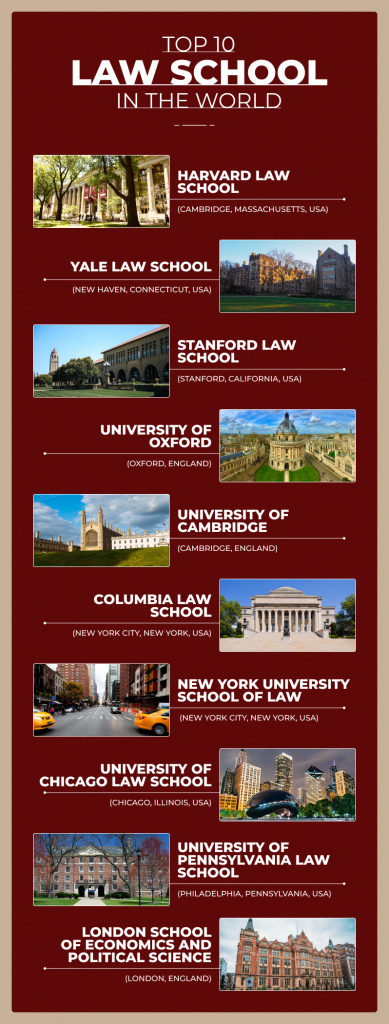
Selecting from the best law schools is a crucial choice that will impact your career. The law shapes our societies, governs our interactions, and protects our rights. At the heart of this intricate system are the legal professionals who interpret, enforce, and advocate within its framework.
Choosing the right legal education is a pivotal first step for aspiring lawyers, setting the stage for a career of profound impact. With countless law schools vying for attention worldwide, identifying institutions that cultivate legal excellence can be daunting.
This article presents a data-informed ranking of the world’s best law schools based on a comprehensive survey of legal professionals. It offers invaluable insights for those embarking on their legal journeys.
Methodology of Ranking
We meticulously surveyed legal professionals worldwide to create this comprehensive ranking. With years of experience in the field, these experts were asked to evaluate law schools based on various key criteria.
Among the standards we applied were:
- Faculty Expertise
- Research Opportunities
- Reputation
- Employment
When evaluating law schools, key factors play a significant role in determining their overall standing.
Among the most crucial factors is the faculty’s experience. A law school with a staff of highly trained and experienced legal academics can offer students outstanding academic advice and mentorship.
Additionally, a strong research focus can enhance the school’s standing. Besides, it can provide students excellent opportunities to advance their intellectual development.
Another important component is alumni success. A law school with a sizable and prosperous alumni network can provide students with beneficial relationships and employment prospects.
Furthermore, accomplishments made by alumni can further enhance a school’s standing and attract elite students.
Moreover, research opportunities are crucial to a law school’s ranking. Students’ research abilities can be enhanced, and legal knowledge can be advanced with financing, mentorship, and research facilities.
Furthermore, job placement rates are another crucial factor. Students who attend a law school with robust career services and a high job placement rate can benefit from them. Besides, these factors, like the assistance and tools they need, help them to launch successful legal careers.
Ranking of the Best Law Schools in the World
While the duration of your law school degree will not differ much the quality of your degree will largely depend on the school you choose!
Wondering what are the best law schools in the world? Fret not! I have them listed.
So, check out this list to learn all about them:

Harvard Law School (Cambridge, Massachusetts, USA)
With a Bar Passing Rate of 96%, Harvard Law School is the first on the list. Harvard is a leading institution globally renowned for its rich history, exceptional faculty, and rigorous academic program.
Its alumni network is extensive, connecting students with influential figures in law and other fields. Additionally, the school offers unparalleled research opportunities, making it a dream destination for aspiring lawyers.
Furthermore, notable alumni include prominent figures like President Obama and Facebook founder Mark Zuckerberg, showcasing the school’s impact on the world.
Notable Legal Professionals: Antonin Scalia, Lewis Powell (LLM), David Souter, William J. Brennan, Harry Blackmun, Felix Frankfurter, Louis Brandeis.
Yale Law School (New Haven, Connecticut, USA)
Secondly, Yale Law School is an Ivy League institution renowned for its demanding academic standards and commitment to public service.
Its faculty boasts many renowned legal scholars, providing students with exceptional mentorship and learning opportunities.
Furthermore, it has a Bar Passage Rate of 97%. The school’s graduates have also achieved significant success in government, law firms, and academia. Moreover, this reflects the institution’s strong reputation and the quality of education.
Notable Legal Professionals: Nicholas Katzenbach, Wayne MacVeagh, Clarence Thomas, Sonia Sotomayor.
Stanford Law School (Stanford, California, USA)
Third, Stanford Law School is a leading institution known for its rigorous academic program and strong emphasis on innovation. Furthermore, it has a Bar Passage Rate of 97%.
Furthermore, its location in Silicon Valley provides students with unique opportunities to connect with technology industry leaders and explore emerging legal challenges.
Additionally, the school’s faculty includes many renowned legal scholars, and its graduates have achieved significant success in law firms, government agencies, and technology companies.
Notable Legal Professionals: Bruce James Highman, Benjamin Carrasco, Mike Ross
University of Oxford (Oxford, England)
Fourth, as one of the world’s oldest and most prestigious universities, Oxford Law School has a long history of producing outstanding legal scholars.
Oxford offers a rigorous academic program and a vibrant intellectual community. Additionally, this combination attracts international students seeking a high-quality legal education and the opportunity to learn from renowned legal experts.
Notable Legal Professionals: Nidhi Singh, Carolyn Evans, Jeremy Lack
University of Cambridge (Cambridge, England)
University of Cambridge Law School is a prominent institution in the United Kingdom, renowned for its strong research focus and commitment to academic excellence.
Additionally, the school provides a rigorous legal education. Therefore, it fosters a vibrant intellectual community and encourages students to engage in cutting-edge research.
Graduates of Cambridge Law School have achieved significant success in various legal fields, holding high-ranking positions in government, law firms, and academia.
Furthermore, the school’s reputation for producing exceptional legal scholars and its commitment to academic excellence make it a highly sought-after destination for aspiring lawyers.
Notable Legal Professionals: Emma Thompson, Derek Jacobi, Christopher Meyer
Columbia Law School (New York City, New York, USA)
Columbia Law School is a renowned institution in the United States, known for its prestigious reputation and strong emphasis on public service and social justice.
Furthermore, the school’s faculty comprises leading legal scholars. They provide students with exceptional mentorship and academic guidance.
With a Bar Passage Rate of 94%, its graduates have achieved significant success in various legal fields. Moreover, they hold important positions in government, law firms, and academia.
Moreover, Columbia Law School’s commitment to academic excellence and social responsibility makes it a highly sought-after destination for aspiring lawyers.
Notable Legal Professionals: Eric Holder, Benjamin Cardozo, Ruth Bader Ginsburg
New York University School of Law (New York City, New York, USA)
New York University School of Law is a leading institution in the United States, renowned for its diverse student body and strong emphasis on international law.
Its location in New York City provides students unique opportunities to network with legal professionals worldwide and explore various career paths.
The school’s faculty includes many renowned legal scholars, and its Bar Passage Rate is 97%. Furthermore, its graduates have achieved significant success in various legal fields, including international law, corporate law, and public interest law.
Additionally, NYU Law School’s commitment to diversity and its focus on international law make it a highly attractive option for aspiring lawyers seeking a global perspective.
Notable Legal Professionals: Amal Clooney, Evan Chesler, Elliot Peters
University of Chicago Law School (Chicago, Illinois, USA)
With a Bar Passage Rate as high as 97%, the University of Chicago Law School is a leading institution in the United States, known for its rigorous academic program and commitment to legal scholarship.
The school’s faculty comprises many renowned legal theorists who provide students with a deep understanding of the law and its underlying principles.
Additionally, the school’s graduates have achieved significant success in academia and government, often holding prestigious positions at top universities and government agencies.
Moreover, Chicago Law School’s focus on intellectual rigor and its commitment to legal scholarship make it a highly attractive option for students seeking a challenging and rewarding legal education.
Notable Legal Professionals: Daniel W Layton, John Michael Murphy, Ronald Jones II
University of Pennsylvania Law School (Philadelphia, Pennsylvania, USA)
Next, the University of Pennsylvania Law School comes second on the list of top law schools worldwide. Besides, it is one of the top universities in the country, well-known for its dedication to public service and robust alumni network.
Numerous well-known legal experts who teach at the institution offer students outstanding academic support and mentoring. Moreover, the Bar Passage Rate of this institution is 96%.
Additionally, its alums have attained notable accomplishments in diverse legal domains, securing prominent roles in governmental bodies, legal practices, and higher education.
Furthermore, Penn Law School is a very appealing choice for students looking for a well-rounded legal education and a solid basis for a successful career because of its emphasis on academic performance and public service.
Notable Legal Professionals: Garrard Beeney, Rodge Cohen, Joe Frumkin
London School of Economics and Political Science (London, England)
Finally, the London School of Economics and Political Science is on the list of the best law schools in the world. I know what you are thinking, “How can THIS be one of the best institutions for law?”
Renowned for its concentration on public policy and international law, the London School of Economics and Political Science (LSE) Law School is one of the top universities in the UK.
Additionally, many well-known legal academics teach at the institution, giving students a thorough understanding of how law and public policy interact.
Moreover, graduates from this program have excelled in various legal professions and frequently hold prominent positions in the public sector, private practice, and higher education.
Furthermore, LSE Law School is a very appealing choice for students looking for a legal education based on real-world concerns and preparing them for a global profession because of its emphasis on public policy and international law.
Key Eligibility Criteria of the Best Law Schools in the World!
While you might want to know some of the things you need to have to be a part of these law schools, there is no one-size-fits-all approach.
However, all of these law schools follow certain important caveats. These include the following:
- Holistic Review: All these schools use holistic admissions, meaning they consider factors like personal essays, letters of recommendation, work experience, and extracurricular activities in addition to the metrics below.
- Minimums vs. Averages: The numbers below are often minimum requirements or average scores of admitted students. Meeting the minimum doesn’t guarantee admission, especially at top schools.
- Changes Over Time: Admission criteria can change, so checking the official school websites for the most up-to-date information is crucial.
- International Students: International applicants often have additional requirements, such as TOEFL/IELTS scores for English proficiency and transcript evaluations.
Based on these, I have divided the institutions into two major categories: US Law Schools and International Law Schools.
US Law Schools
| School | LSAT Score (Median) | GPA (Median) | Key Considerations Beyond Numbers |
| Harvard Law School | 173 | 3.9 | Strong personal essays, exceptional letters of recommendation, demonstrated leadership, commitment to public service or a specific area of law. |
| Yale Law School | 174 | 3.93 | Emphasis on intellectual curiosity, original thinking, and potential for academic excellence. Strong preference for applicants with a demonstrated commitment to public interest or legal scholarship. |
| Stanford Law School | 171 | 3.87 | Focus on innovation, entrepreneurial spirit, and potential to contribute to the legal field in unique ways. Proximity to Silicon Valley influences some admissions decisions. |
| Columbia Law School | 172 | 3.85 | Strong interest in law and business, international law, or human rights. Location in New York City provides access to diverse legal opportunities. |
| NYU School of Law | 170 | 3.8 | Emphasis on public interest law, international law, and business law. Diverse student body and strong clinical programs. |
| University of Chicago Law School | 171 | 3.9 | Emphasis on rigorous legal scholarship and theoretical approaches to law. Strong preference for applicants with a demonstrated interest in legal theory and academia. |
| University of Pennsylvania Law School | 169 | 3.8 | Strong focus on business law, public service, and interdisciplinary studies. Close ties to the Wharton School of Business. |
International Law Schools:
| School | Key Considerations |
| University of Oxford (UK) | Typically requires a first-class or strong upper-second-class undergraduate degree in any subject. Emphasis on academic excellence and intellectual potential. Interviews are often part of the admissions process. |
| University of Cambridge (UK) | Similar to Oxford, it requires a strong undergraduate degree.Emphasis on intellectual ability and suitability for the intensive tutorial system.Interviews are usually required. |
| London School of Economics (UK) | Requires a good undergraduate degree, typically a 2:1 or above in a relevant subject.Strong emphasis on academic merit and potential for graduate study.Prior study in law or related fields is often preferred but not always required. |
When it comes to these international law schools, there are a few things that you might need to have. These are as follows:
- Academic Transcripts: Strong performance in previous university studies is essential.
- Personal Statements/Essays: These are crucial for demonstrating your interest in law and suitability for the program.
- Letters of Recommendation: Strong letters from academics or professionals who can speak to your abilities are important.
- English Language Proficiency: If English is not your native language, you’ll likely need to provide TOEFL or IELTS scores.
Best Law Schools: Things to Keep in Mind While Choosing
Ultimately, pursuing a legal career is a significant decision, and the path to becoming a lawyer is demanding but rewarding. Here’s some practical advice to guide you through the process, from preparing for applications to succeeding in law school:
1. Pre-Application Preparation:
- Understand the Legal Profession: Before committing to law school, understand what lawyers do. Shadow attorneys, intern at law firms or legal organizations, or volunteer at legal aid clinics. This firsthand experience will confirm your interest and help you identify areas of law that resonate with you.
- Focus on Strong Academics: Law schools value strong undergraduate performance. Additionally, maintain a high GPA and choose challenging courses that develop critical thinking, reading comprehension, and writing skills.
- Master the LSAT (or Equivalent): The Law School Admission Test (LSAT) is crucial in admissions. Dedicate ample time to studying and practicing using official LSAT materials. Consider taking a prep course if needed. For international students applying to schools outside the US, research the equivalent standardized tests or admission requirements.
- Develop Strong Writing Skills: Legal writing is essential. Take writing-intensive courses and seek feedback on your writing. This will be invaluable for personal statements, legal memos, and exams.
2. The Application Process:
- Research Law Schools Thoroughly: Don’t just focus on rankings. Consider location, size, faculty expertise, specialized programs, clinical opportunities, and career placement rates. Align your school choices with your career goals.
- Craft Compelling Personal Statements: Your statement is your opportunity to tell your story and demonstrate why you want to study law. Highlight your experiences, motivations, and unique qualities. Show, don’t just tell.
- Secure Strong Letters of Recommendation: Request letters from professors or professionals who know you well and can speak to your academic abilities, work ethic, and character. Give them ample time and provide them with relevant information, such as your resume and personal statement.
- Pay Attention to Deadlines: Law school application deadlines vary. Create a timeline and ensure you submit all materials on time.
- Consider Early Decision (Carefully): Some schools offer early decision options, which can increase your chances of admission but require you to commit to attending that school if accepted. Weigh the pros and cons carefully.
3. Financing Your Legal Education:
- Explore Financial Aid Options: Research federal and private student loans, grants, and scholarships. Complete the Free Application for Federal Student Aid (FAFSA) if applicable.
- Investigate Law School Scholarships: Many law schools offer merit-based and need-based scholarships. Research the specific scholarship opportunities offered by the schools you’re interested in.
- Create a Budget: Law school is expensive. Develop a realistic budget to manage your finances and minimize debt.
4. Succeeding in Law School:
- Develop Effective Study Habits: Law school requires rigorous reading, analysis, and memorization. Additionally, develop effective study techniques, such as outlining, briefing cases, and forming study groups.
- Engage in Class Participation: Active participation in class discussions enhances your understanding of the material and develops oral advocacy skills.
- Seek Mentorship and Networking Opportunities: Connect with professors, alumni, and legal professionals. Attend networking events and conferences.
- Take Advantage of Clinical Programs and Externships: These practical experiences provide valuable hands-on legal training and can help you explore different areas of law.
- Prioritize Well-being: Law school can be stressful. Maintain a healthy work-life balance, prioritize sleep, exercise, and social connections. Seek support from the school’s counseling services if needed.
5. Choosing the Right School for Your Career Goals:
- Identify Your Legal Interests: What areas of law are you passionate about? Different law schools have strengths in different areas.
- Consider Location and Networking Opportunities: Where do you want to practice after graduation? Choosing a school in that region can provide valuable networking opportunities.
- Research Career Placement Data: Finally, look at the school’s employment statistics, including placement in different sectors (e.g., law firms, government, public interest).
Additional Reading:
- False Light Vs. Defamation
- Section Officer Duties And Responsibility
- Things To Consider While Finding A Good DWI Lawyer

![Why Are People Searching For A Roblox Lawsuit Lawyer At Dolman Law? [Complete Guide]](https://lawyersinventory.com/wp-content/uploads/2026/02/roblox-lawyer-dolmanlaw.com-roblox-lawsuit-100x100.png)









0 Reply
No comments yet.